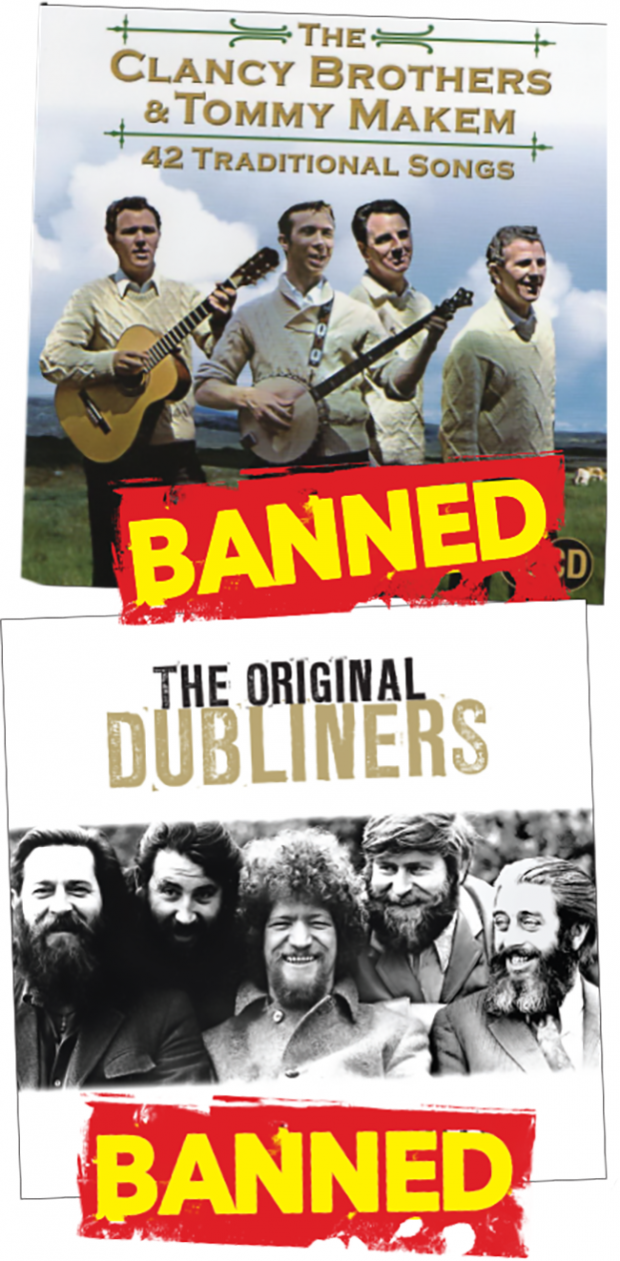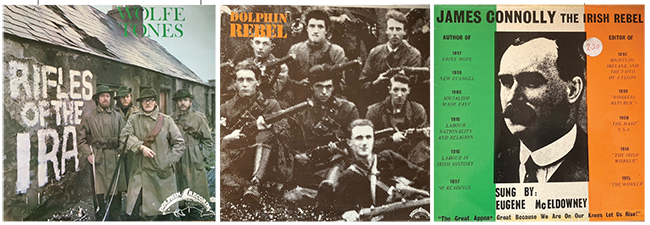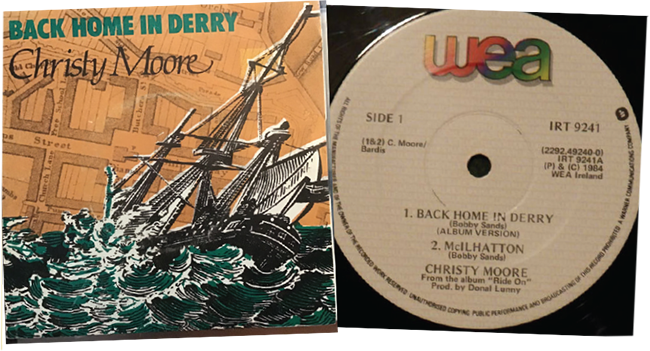27 January 2022 Edition
Armoured cars and tanks and bans

• Songs by mainstream groups such as the Clancy Brothers and Tommy Makem and The Dubliners had Section 31 bans
Songs have always played an important role in the struggle for Irish freedom. 50 years ago, as the republican struggle entered a new phase of resistance to British rule in the Six Counties, republican ballads became widely popular and were even chart hits. Governments soon clamped down and rebel songs disappeared from the airwaves. These conventions are still in force today. Jason Lambert takes a wry look back.
A question. What have ‘The Men Behind the Wire’ by Barleycorn and the Bing Crosby song, ‘On a Slow Boat to China’ got in common? They were, according to John Clarke RTÉ station manager in 2007, the only two songs to be officially banned by RTÉ itself and not covered by direct political censorship, such as Section 31 of the Broadcasting Act.
According to Mr Clarke, ‘The Men Behind the Wire’ was “glorifying the IRA during the Northern Troubles”. ‘On a Slow Boat to China’ was banned because of the single line “I want to get you on a slow boat to China”, apparently a well-known phrase amongst poker players meaning someone who loses slowly but over a period of time. This writer does not see an issue with this in a love song, with the composer wanting to spend as much time as possible with his partner. But I’m not here to advocate for Bing!
The other song written by Paddy McGuigan of Belfast and recorded with his band The Barleycorn, ‘The Men Behind the Wire’ is a factual, historically correct account of the action of the British Army under orders from the British government when they mounted Operation Demetrius against the nationalist communities across the Six Counties on 9 August 1971.
Operation Demetrius was internment and involved the mass arrest and imprisonment without trial of people suspected of being involved with the IRA or otherwise enemies of the state. It was proposed by the Unionist government at Stormont and approved by the British cabinet. Armed soldiers launched dawn raids throughout nationalist areas and arrested 342 people in the initial sweep, sparking four days of violence in which 20 civilians, two IRA members and two British soldiers were killed. All of those arrested were Irish republicans and nationalists, the vast majority of them Catholics.

Due to faulty and out-of-date intelligence, many were no longer involved in republican militancy or never had links with the IRA. Ulster loyalist paramilitaries were also carrying out acts of violence, which were mainly directed against Catholics and Irish nationalists, but no loyalists were included in the sweep.
If we are to examine the lyrics of this song, at no point does it “glorify the IRA”, it simply calls out for civil resistance to the indiscriminate internment of mostly young men based on their address, religion, and politics.
For centuries in Ireland, it was the bards and storytellers who announced the news in towns and villages and on many occasions archived these events in song. Songs and music have always played an integral part of Irish life and for them to be banned for simply relaying history was completely wrong.
Around this time, many well-known bands were playing support gigs for An Cumann Cabhrach (republican prisoners aid committee) and other fundraising efforts, including the Dublin City Ramblers, the Wolfe Tones, the Barleycorn, and Belfast band the Flying Column. The last of whom had a hit with ‘Johnsons Motor Car’, which was also banned under Section 31.
Kerry republican Eddie Barrett, living in Dublin in the early ‘70s, recalls many packed gigs at Dublin venues such as The Shieling Hotel and The Embankment, with well-known ballad groups playing in aid of republican prisoners, a scene replicated across the state but not reflected by the ‘national broadcaster’.
And then there was Christy Moore. Has there been any Irish performer who has had so many songs ignored and removed from playlists by RTÉ and other radio stations for their outspoken content? Section 31 of the Broadcasting Act and the self-censorship regime it inspired caused a number of his songs to be never played on radio.
‘90 Miles from Dublin’ as it expressed support for republican prisoners in the H-Blocks of Long Kesh. ‘Mcllhatton’ and ‘Back Home in Derry’ were banned as they had been written by Bobby Sands. ‘The Time has Come’ was banned by RTÉ as it was written about 1981 hunger striker Patsy O’Hara’s grieving family. And naturally, the song ‘Section 31’ was banned for obvious reasons! Often these bans were informal, broadcasters simply did not play them. In the case of ‘The Time has Come’, it was initially broadcast and only taken off the air when they realised its subject.
Bizarrely, because Christy’s humorous song ‘St Brendan’s Voyage’ mentioned Gibraltar, the BBC banned it lest it evoke a memory of the killing of three IRA Volunteers there in 1988. I know it sometimes irks me to see some broadcasters lauding Christy so long as he only sings about his little Honda 50. Though in Christy’s case, his talent, integrity, and popularity have overcome all these barriers.
Christy recently took part in the relaunch of his banned H-Block album in Tar Abhaile in Belfast, surrounded by ex- prisoners. He presented Fra Mc Cann with an original copy of the vinyl to mark his retirement, one of two records which were returned to Christy by an ex-Garda Special Branch man who confiscated it after the album launch. Good man, Git!

• Christy Moore's recordings of ‘Back Home in Derry’ and ‘Mcllhatton’ were banned because they were written by Bobby Sands
Section 31 scared DJs and journalists and they shied away from rebel songs, afraid of losing their jobs. They became taboo, banned or blacklisted. In this manner, the media, both radio and press, were left in the hands of those who were indifferent to Ireland, its music and its heritage. Ironically, when RTÉ television began in the 1960s, it coincided with the folk music revival and the ‘ballad boom’ and rebel songs were featured as an integral part of the tradition - until actual rebellion broke out in the Six Counties.
Well-known songs were banned in the early ‘70s like ‘Four Green Fields’ and ‘The Patriot Game’, all covered by mainstream groups such as the Clancy Brothers and Tommy Makem and The Dubliners. Alongside the Section 31 bans here in Ireland from 1971 to 1993, other Irish bands based in England, such as The Pogues were also censored on BBC radio by the British broadcasting ban from 1988 to 1994.
‘Who Fears to Speak of ‘98, who blushes at the name?’ says the song. It seems the fear and blushes covered a multitude; the name of Wolfe Tone, the men and women of 1916, the freedom fighters of the Tan War and Civil War, nationalists in the Six Counties who stood firm as they were burned out of their homes and treated as second-class citizens, those who joined the ranks of the IRA and fought back against British oppression, who died on active service or died in the cages of Long Kesh...
Brian Warfield of the Wolfe Tones set a great example to me in conversation recently. In the lead up to the Fine Gael-led government’s disastrous plan to commemorate the Black and Tans, the band decided to re-release their 1972 hit, ‘Come Out You Black and Tans’.
Across Ireland and Britain, the song shot to the top of the download charts. That’s how it’s done these days; you would have needed to sell a minimum of 4,000 records back in the day to feature in the Top 20!
The band decided to donate all profits to the Fr. Peter McVerry Trust, while Brian was contacted by some newspapers and radio stations, he was never given any airtime and, lo and behold, neither was Dominic Behan’s ballad! I urge readers to listen to the Wolfe Tones song ‘Radio Toor-I-Li-Ay’ from their ‘Sing Out for Ireland’ as a good backdrop to this article.
So historic Irish ballads are still shunned, apart from a small number of DJs and local community stations. So, you know what to do folks, get on the phones, get on Twitter and email and request the songs of our nation and its freedom. Up the rebels!
Jason Lambert is a Sinn Féin activist, and parliamentary assistant to Sinn Féin TD Paul Donnelly



